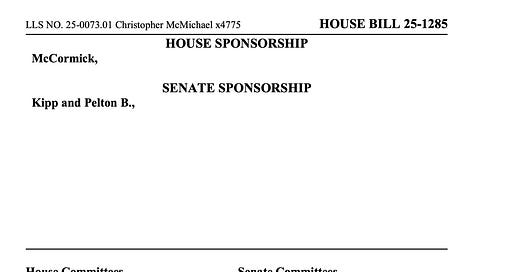Veterinary Professional Associate (VPA) Update - Bill 25-1285
Colorado bill introduces limitations to the VPA role
The passage of Prop 129 in Colorado has been met with outrage from the veterinary community. Prop 129 established the role of a VPA, or a veterinary professional associate, which was meant to act similarly to an NP or PA on the human side…except with much less education. A five semester curriculum, mostly online, was meant to give these VPAs the ability to do surgery and act as independent practitioners…under a veterinarians license.
Its passage was awful but inevitable - it was touted as a way to lower veterinary bills and increase access to care. It was a promise that was too good to be true, as it did absolutely nothing to address the underlying causes of either issue.
Thankfully, efforts from multiple groups have been made to curtail the responsibilities of the VPA role. The creators of the VPA role envisioned them performing spays and neuters, potentially limb amputations or even splenectomies, all under “supervision” of a veterinarian. How close did they imagine this supervision to be? Maybe via telemed, maybe one veterinarian for multiple locations…who knows!
A bill introduced last week seeks to put limitations - rightfully - on such a role.
Key takeaways from the bill…
“…a VPA is only permitted to practice veterinary medicine under the immediate or direct supervision of a supervising licensed veterinarian. Telesupervision of a VPA…is not permitted.”
This is an important distinction, as many were worried about clinics staffed entirely by VPA personelle with a veterinarian available via telehealth, or perhaps one veterinarian for a chain of clinics in a region.
“the supervising licensed veterinarian and VPA are located at the same veterinary premise while practicing veterinary medicine”
Again, another way to close the loophole of 1 veterinarian for several VPAs scattered amongst clinics.
“The licensed veterinarian or the VPA has obtained informed consent from the client”
Many worried that owners would be unaware they’re seeing a VPA instead of a veterinarian. Sure, some owners just sign things and don’t read them, but this attempts to inform owners of the difference.
“Approve a nationally recognized VPA credentialing organization that requires a VPA to complete an accredited university program for VPAs, pass a VPA examination, and complete continuing education requirements”
“Provide guidance to supervising licensed veterinarians in their delegation of tasks to and supervision of VPAs”
This was another major point, as the creators of Prop 129 made note of VPAs seeing “uncomplicated” cardiac cases.
“Establish an equivalent registration pathway for a veterinary technician specialist…as a substitute for the education requirements needed to register as a VPA”
When Prop 129 was first floated, many didn’t understand why the role of VTS couldn’t be elevated. VTS is an already established role, with strict guidelines in order to apply for and obtain a VTS. As such, many VTS felt like the VPA bypassed their higher level of education and specialty, as well as the years required in the field to obtain a VTS.
“veterinarian-client-patient relationship must be established and maintained only by a licensed veterinarian”
“A corporation, employer, director, or officer shall not require a licensed veterinarian to supervise a veterinary professional associate as a condition of employment”
This was a HUGE scare for many veterinarians, especially those in corporate medicine. Would they be fired if they refused to oversee a VPA? Would they have to put their license on the line to maintain employment? I hope this worded in a way in which these organizations cannot limit a veterinarian due to their unwillingness to work with a VPA. If this means they adjust their schedule, or severely limit their hours - well, that’s a serious concern as well.
“…supervising only a single veterinary professional associate who is practicing veterinary medicine at any one time”
Again, addressing the concern of one veterinarian and 5 VPAs
The bill is far from perfect, but it does close a lot of the loop holes veterinarians were worried corporations and organizations would use to cut costs and increase profits at the expense of pet owners.
This is an important development, especially as Florida looks to pass something similar next legislative session. Florida does not have title protection for veterinary technicians at the time of this writing, so it’s interesting to see how they’ll address the veterinary technician to VPA pipeline without any credentialing.
Thank you to Dr. Carter for keeping the veterinary community up to date with the latest news about the VPA position!





I’m glad to see these limitations added! As you state, it’s still not perfect (I have substantial concerns about the surgical scope of practice), but it’s great that they ruled out some of the most egregious problems in black letter law